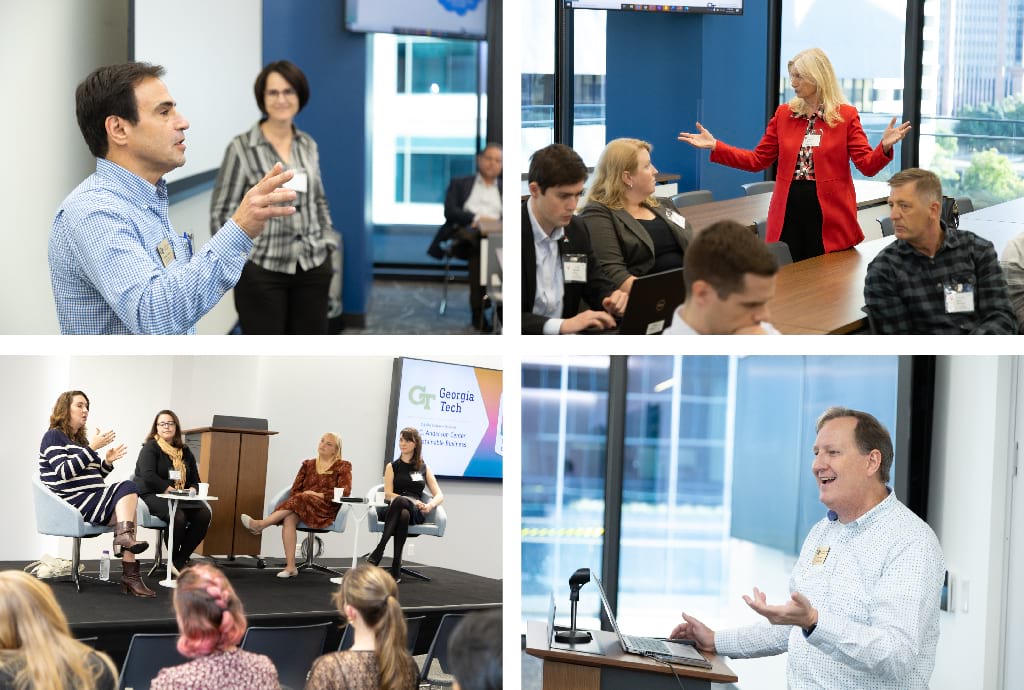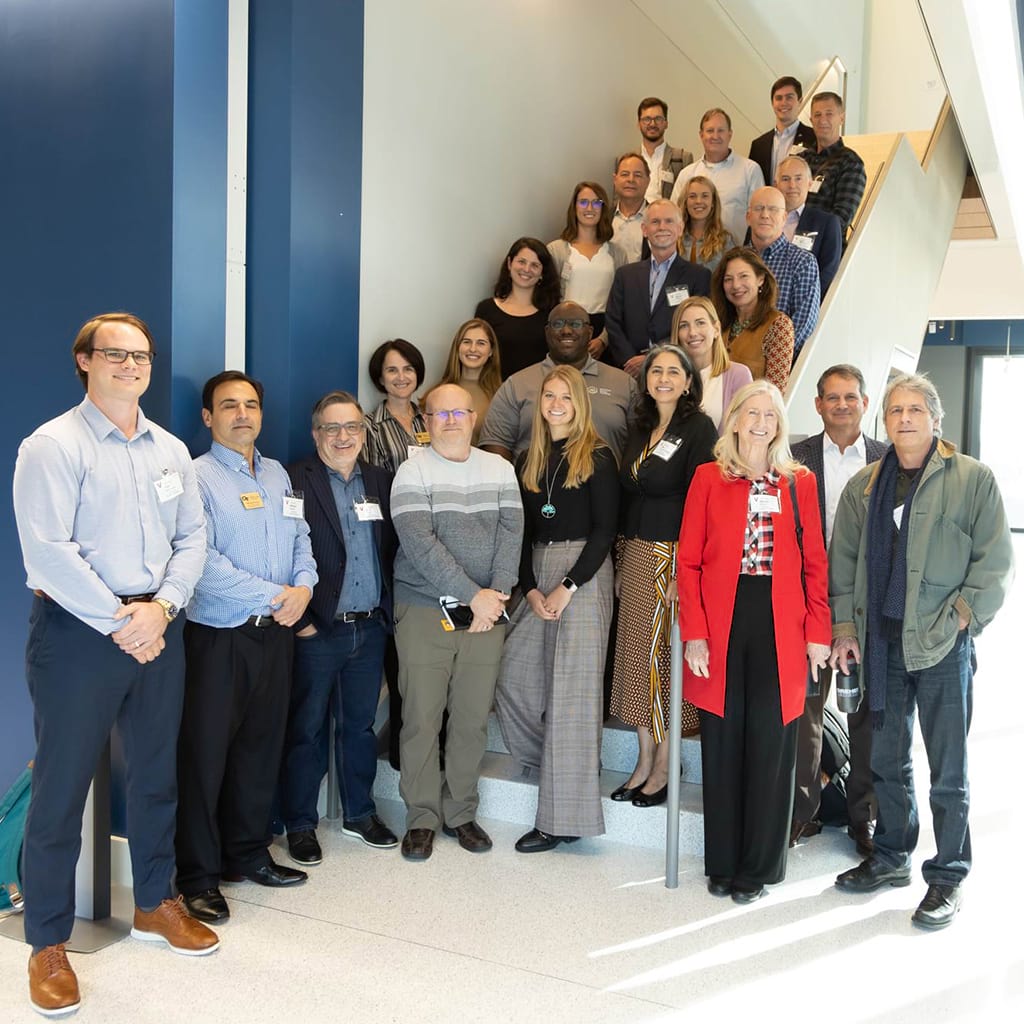Forty-four organizations (and counting) unite to scale business solutions that will help Georgia reach net zero carbon emissions.
What a difference a year makes! The Drawdown Georgia Business Compact (Compact) recently celebrated the first anniversary of its launch. In October 2021, the Ray C. Anderson Center for Sustainable Business (Center) founded the Compact – a collective impact initiative to help businesses in Georgia work together to help the state reach the ambitious goal of net zero carbon emissions. Reflecting on the legacy of Ray C. Anderson, Center Managing Director Michael Oxman said, “Ray was advocating for corporate attention to sustainability at a time [the mid-1990s] when a lot of companies weren’t taking action like that which he was driving at Interface. The Compact is one piece of evidence that his vision is being realized. Forty-four organizations — of different sizes and representing different sectors — have come together to take action.”
Continue reading to learn more about the Compact, to hear highlights from the past year, and to get a sneak peek at what is on the horizon.

How It All Began
The Compact is a partner initiative of Drawdown Georgia, a movement that provides Georgia with a road map of high-impact climate solutions developed through a research collaboration. Georgia is one of several states expected to be hit hardest by climate change. The Center launched the Compact to help Georgia businesses activate and scale the solutions identified by the research team. It also is intended to provide a forum for addressing “beyond carbon” aspects, including equity, public health, environmental quality, and economic opportunity. The goal of the Compact is to leverage the collective impact of Georgia’s business community to achieve net zero carbon emissions in the state by 2050 through a just, prosperous, and sustainable transition. The Compact launched with the support of 16 founding members.
Early Activities Build Community
The Compact launched with a series of panels focused on climate action and business leadership, equitable and inclusive innovation, and research related to climate solutions. The Center and the Compact also produced an event in partnership with the Atlanta Press Club’s Newsmaker Leadership Series. “The Business of Climate Solutions, Local to Global,” featured Georgia Tech President Ángel Cabrera in conversation with Delta Air Lines CEO Ed Bastian on how businesses can make positive changes to address urgent issues such as climate change. The talk was moderated by SaportaReport editor Maria Saporta and CNN national correspondent Nick Valencia. Early events focused on connecting members, sharing best practices, and informing the public on what Georgia businesses are doing to be more sustainable.
Gathering the Troops
Assembling member organizations has been the primary goal of the Compact’s first year. Center Industry Engagement Manager David Eady said, “We targeted our outreach around the leadership of Georgia – organizations headquartered or operating here.” Eady emphasized the importance of getting organizations that are climate leaders in their respective fields on board to establish the legitimacy of the Compact and showcase it as a business opportunity. Equally as important as welcoming Fortune 500 companies was bringing in startups, small and medium-sized companies, and representatives of a wide variety of sectors. As companies were recruited and membership grew, the Compact began the conversation about what members could do together. Eady said, “We’ve built the platform, and now we’re getting down to action.”

An Eye on Equity
Compact leadership has been intentional about inclusion. All types of organizations will be affected by climate change and need to be a part of the solution. Compact leadership wants to ensure the Compact is representative of Georgia's business community and that it offers opportunities for a wide range of organizations. The Compact is working towards a net zero future while always keeping an eye on equity. Currently, about one-third of the 44 member organizations are small, startup, or minority-owned businesses. Leadership continues on a deliberate path to expand Compact membership among these critical cohorts. The Compact is also working to center equity considerations in the projects under consideration by members.
Feel the Energy: YKK and SolAmerica
Compact organizations are feeling the energy of collaboration. That’s especially true for YKK and SolAmerica, who have connected on the topic of renewable energy. YKK, the world’s largest zipper manufacturer, has an ambitious target: to switch to 100% renewable energy by 2030. SolAmerica, on the other hand, helps businesses deploy solar energy solutions. Todd Baldwin, director of environmental affairs for YKK Corporation of America, stated, “We face a challenge because there are so many variables from country to country. So, we’re looking at a regional approach. What we do in Georgia will help other regions. We all share the same atmosphere.” The Compact helped make the match between YKK’s sustainability challenge and potential solutions. SolAmerica has been assisting YKK in gathering information about creating a solar farm or purchasing an existing one in Georgia. Baldwin said, “SolAmerica has been really helpful in providing information. As a result of joining the Compact, we got connected.”

Engaging the Ray C. Andersons of Tomorrow: Kelsi Swenson & UPS
When Kelsi Swenson (MBA ’21) entered the Evening MBA program, she was working in the area of compensation and benefits. She said, “I loved the company but not my career path. I knew I wanted to pivot.” At Georgia Tech, she enjoyed the sustainability coursework. When she was ready to make her career move, the Center was there for her. Swenson said, “Michael Oxman believed supporting the Compact would be a great way to network with sustainability leaders from some great Atlanta companies.” One such leader was Elba Pareja-Gallagher, director of sustainability and stakeholder engagement at UPS. A conversation with Pareja-Gallagher helped Swenson land a UPS sustainability fellowship. Swenson is now realizing her dream, leading the sustainability employee resource group, responding to customer questions on UPS sustainability, and supporting sustainability efforts and work streams related to stakeholders. “I would not be in my role at UPS without my involvement with the Compact,” Swenson reflected.

Opportunities Ahead
The Compact is working actively across five subgroups that align with original research solutions (i.e., electricity, transportation, buildings/materials, food/agriculture, and land sinks) to identify and prioritize concrete projects for Compact focus. One opportunity for collective impact that has emerged from these discussions is a forest carbon project whereby interested members would support landowners (small and large) in managing their land to sequester carbon in return for carbon credits. Other project ideas focus on community resilience via solar and battery storage, expanding EV infrastructure, and supporting a locally sourced food procurement ecosystem.
In addition to these project initiatives, the Center has partnered with other organizations on Department of Energy and National Science Foundation grant applications focused on agrivoltaics and a regional climate tech innovation hub. If the grants are successful, they will help to extend Compact activities in these areas.
Interested in joining the Compact? Please visit the Compact website or contact David Eady (david.eady@scheller.gatech.edu).
Written by Jennifer Holley Lux
